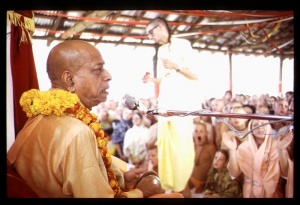SB 12.6.9-10

A.C. Bhaktivedanta Swami Prabhupada
Please note: The synonyms, translation and purport of this verse were composed by disciples of Śrīla Prabhupāda
TEXTS 9-10
- parīkṣid api rājarṣir
- ātmany ātmānam ātmanā
- samādhāya paraṁ dadhyāv
- aspandāsur yathā taruḥ
- prāk-kūle barhiṣy āsīno
- gaṅgā-kūla udaṅ-mukhaḥ
- brahma-bhūto mahā-yogī
- niḥsaṅgaś chinna-saṁśayaḥ
SYNONYMS
parīkṣit — Mahārāja Parīkṣit; api — furthermore; rāja-ṛṣiḥ — the great saintly King; ātmani — within his own spiritual identity; ātmānam — his mind; ātmanā — by his intelligence; samādhāya — placing; param — upon the Supreme; dadhyau — he meditated; aspanda — motionless; asuḥ — his living air; yathā — just as; taruḥ — a tree; prāk-kūle — with the tips of its stalks facing east; barhiṣi — upon darbha grass; āsīnaḥ — sitting; gaṅgā-kūle — on the bank of the Gaṅgā; udak-mukhaḥ — facing north; brahma-bhūtaḥ — in perfect realization of his true identity; mahā-yogī — the exalted mystic; niḥsaṅgaḥ — free of all material attachment; chinna — broken off; saṁśayaḥ — all doubts.
Translation and purport composed by disciples of Śrīla Prabhupāda
TRANSLATION
Mahārāja Parīkṣit then sat down on the bank of the Ganges, upon a seat made of darbha grass with the tips of its stalks facing east, and turned himself toward the north. Having attained the perfection of yoga, he experienced full self-realization and was free of material attachment and doubt. The saintly King settled his mind within his spiritual self by pure intelligence and proceeded to meditate upon the Supreme Absolute Truth. His life air ceased to move, and he became as stationary as a tree.